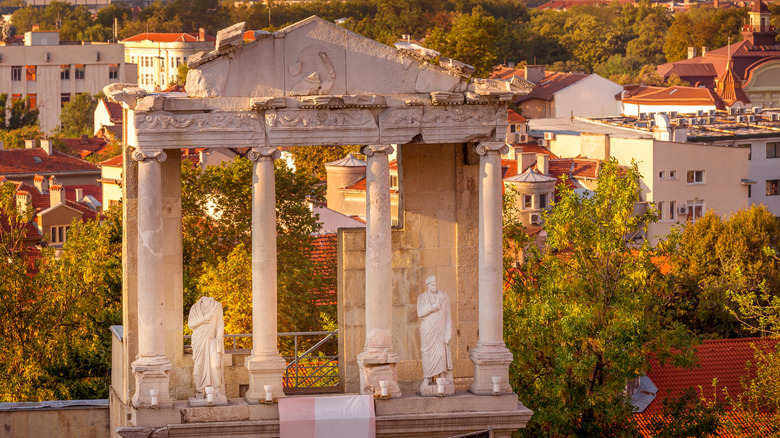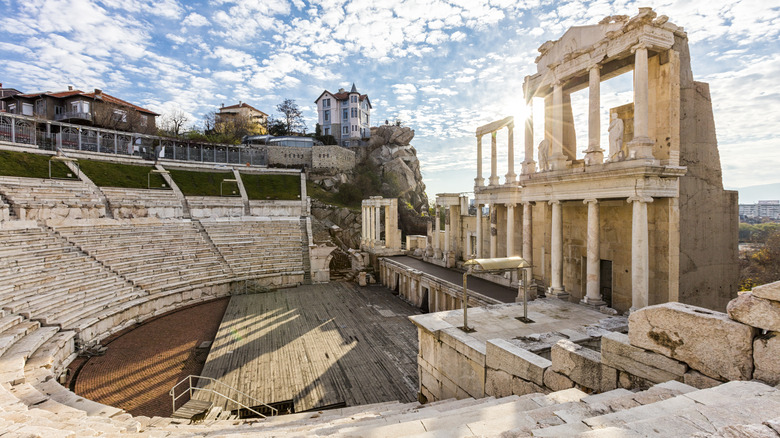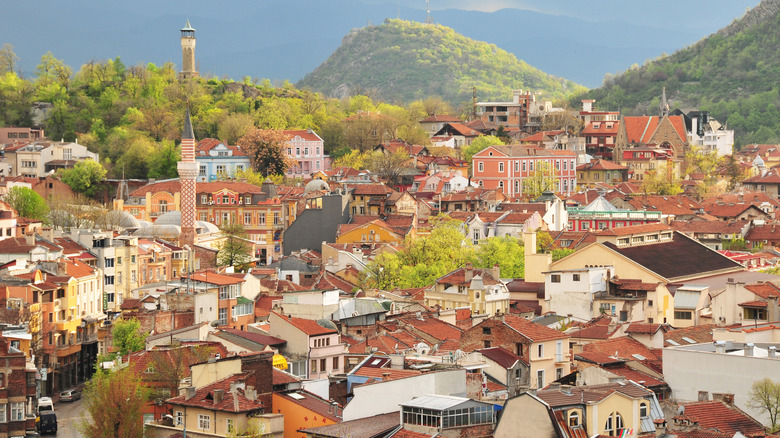Ancient Roman Ruins Are Spread Out Underneath The Streets Of This Lesser-Visited Bulgarian City
There's a race track running directly beneath the bustling, pedestrianized shopping street in Plovdiv's city center. Thousands of feet tread daily over the land where spectators once gathered from all over the vast Roman Empire, flocking to watch the Pythian sprinters, swaddling-cloth-clad wrestlers, and hurtling chariots. Here, 30,000 roaring fans hissed and cheered for famed sportsmen from across the Mediterranean. The 2nd-century stadium, one of the largest in the empire, wasn't the only draw of the ancient capital of the Roman province of Thracia. Visitors can still explore the regal amphitheatre, stately forum, and sprawling cosmopolitan city that have attracted travelers since antiquity. A less chaotic and uncrowded alternative to Pompeii or Rome, Plovdiv's historical sites don't attract the same swathes of tourists that their Mediterranean counterparts do. Many of the best ancient sites are underrated, and they come without the queues.
The modern city of Plovdiv has evolved over its ancient foundations, developing its own distinct cultural identity. 2019's "European Capital of Culture" and Bulgaria's second largest city, Plovdiv can be reached via an easy three-hour train from Sofia, under the shadow of the country's central mountains. Subject to extreme seasons, you could be sightseeing under the scorching sun or through the smog of heavy snowfall, depending on the time of year you plan your trip. Shoulder seasons are ideal, when the negligible tourist crowds are reduced to practically zero and the climate is more manageable.
Tour the Roman ruins remaining in the ancient Thracian capital
Crowned by marble figures who oversee the city from their hillside heights, the ancient amphitheater of Philippopolis still stands. A jewel of the city that once stood in Plovdiv's place, named for Philip II of Macedon (its conqueror and father of Alexander the Great), tragedies and comedies have played out on its stone stage since the 2nd century A.D. Climb its ascending seating, explore the underground passages designated for busy backstage crews, or get into the ancient mindset and attend a concert held in the historic setting. While gladiators may no longer fight wild animals on the stage, the city still holds opera performances and visitors can still buy tickets to sit in the exact seats the Romans once watched from — be sure to check your seat, some of them are still inscribed with a "friend of the emperor" designation.
While the stadium and the amphitheater are the best conserved of the city's ruins, there are many more fascinating archeological sites across the city. In the former Forum, a 1st-century construction, keen-eyed observers can clearly distinguish the odeon, the treasury, the library, and the day-to-day shops that once constituted the center of city life in Roman Philippopolis. Equally, the East Gate and remnants of the original city walls display the grand fortifications built under the reign of Marcus Aurelius, signifying the importance of the city itself. Additionally, if you stay overnight at Villa Flavia, a boutique hotel in the city center, you can explore the Roman baths that they have been excavating in their basement.
Explore the modern city of Plovdiv
The sloping "City of Seven Hills" has prospered since its far-gone Roman heyday, and remains one of the most affordable honeymoon destinations thanks to the spectacular scenery. Start your day strolling past al fresco café hoppers sipping espresso on the pedestrianized streets of Kapana, stopping by for a browse at combined art gallery and coffee shop Cu29. The city's young art scene leans too on its ancient roots. You'll see it on clear display at the Ancient Baths (which was actually a 16th-century Turkish installation rather than a vestige of antiquity). The 500-year-old hammam's authentic interiors have been conserved, and now play host to contemporary art exhibitions. Many more relics of the Ottoman rule exist across the city, with mosques sitting alongside adorned Orthodox churches and imperial Turkish homes being converted into living history museums.
Stick to the narrow, paved streets of Kapana, overhung with twinkling lights as evening falls over the city center. It's the best place to grab dinner and to try authentic Bulgarian cuisine. Join the carnivorous locals over a heaped portion of pork knuckle at romantic Memory, indulge in fresh seafood at Tams House, or try traditional pleskavitza with an equine twist at Aylyakira. Pair your meals with a few glasses of Thracian wines, crafted locally in Bulgarian wineries. Like Georgia, Bulgaria is home to one of Europe's most underrated wine regions.


